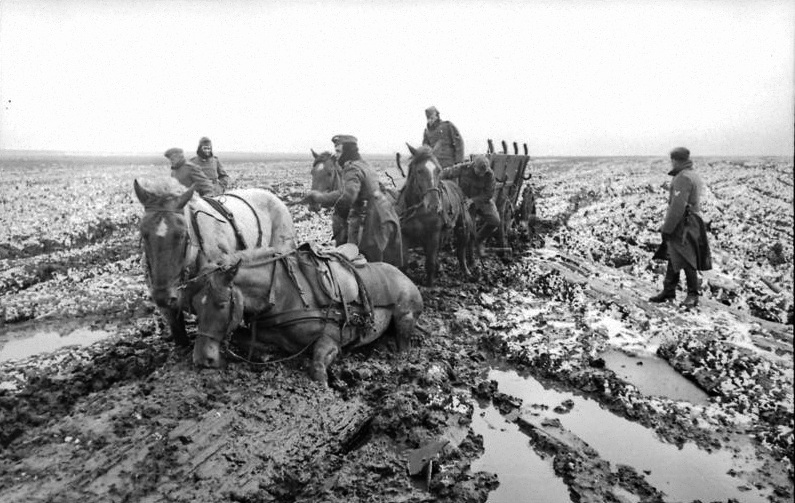Peter Huchel ( 1903- 1981)
Photo : Operation Barbarossa, March 1942, from German Federal
Archive, in public domain via Wiki-media Commons
World War 2 poetry from Germany has been requested, and as there seems to be a revival of interest in the former DDR ,I have been looking at the work of Peter Huchel and Johannes Bobrowski. Bertold Brecht is probably the most famous DDR poet, and could well be the subject of another blog post. (Brecht has the honour of writing one of my favourite ever poems How Fortunate the Man With None ),
British interest in the work of both poets developed in the 1960's and early 1970's, mainly through the dedication shown by poet-translators such as Michael Hamburger and Mathew and Ruth Meads, yet seems to have stalled.
Roads
Choked sunset glow
Of crashing time
Roads.Roads.
Interesections of flight.
Chart tracks across the ploughed fields
That with the eyes of killed horses
Saw the sky in flames.
Nights with lungs full of smoke,
With the hard breath of the fleeing
When shots
Struck the dusk
Out of a broken gate
Ash and wind came without a sound,
A fire
That sullenly chewed the darkness.
Corpses,
Flung over the rail tracks,
Their stifled cry
Like a stone on the palate.
A black
Humming cloth of flies
Closed their wounds.
Translation of Peter Huchel poem by Michael Hamburger from 'East German Poetry' (1970)
Peter Huchel was born in Berlin in 1903 and educated at Berlin Freiburg and Vienna universities. According to his entry in 'Poemhunter.com' , Huchel travelled in different European countries, and published poetry from 1931- 1936 that was inspired by the landscape of Brandenburg. Other on line sources maintain that his first poetry collection was published then quickly withdrawn in 1932. Huchel was conscripted into the German Army in 1940- 1945 and fought on the Eastern Front, being captured in 1945 and held as a Prisoner of War. It is difficult to find exact dates but by 1949 Huchel was in East Berlin, started broadcasting on radio, and also began editing a magazine 'Sinn und Form' ('Sense and Form' ) . With the establishment of the Berlin Wall in 1961, Huchel's career prospects went into reverse and he lost the editorship ; The magazine needed to give priority to the work of pro-Soviet poets. Living in Stasi enforced isolation, Huchel was finally allowed to leave the DDR in 1971. After spending time in Rome, he settled in West Germany, dying in 1981.
'Psalm'
"The desert now will be history
Termites with their pincers
Write it
On sand
And no one will enquire
Into a species
Eagerly bent
On self-extinction ."
translated by Michael Hamburger from East German Poetry (1970)
Another poet from the DDR was Johannes Bobrowski (1903-1965), who also fought on the Eastern Front and spent several years as a Soviet prisoner of war. A few months before his, death Bobrowski was asked in an interview conducted in East Berlin, which poet has inspired him the most. He replied
" Peter Huchel of course. I first read (a) poem of his in Soviet prison camp in a newspaper, and it impressed me immensely." ( Quote taken from Rich Ives 1980 article)
I have not quite worked out whether Huchel was being published in a prison camp magazine as both men were Prisoners of War at roughly the same time. Peter Huchel was later to publish five Bobrowski poems in 'Sinn und Form' in 1957. Both poets work contained elements of 'Natursprache' - defined by the critic Nicolas Yuille as being the concept that "nature objects are part of language system that refers to a higher order."
One of my personal favourites Peter Huchel 's poems is 'The Pastor Reports on the Downfall of His Parish' , in which Christian eschatology undergoes a meltdown due to the ferocious impact of war. The whole notion of Christ is demolished and the verse ends ominously "Here was no Law. My day had been to brief to recognise God."
'The Pastor Reports on the Downfall of His Parish'
"It was not the fall of hell:
As if pelted by stones in a vast fury
That melted even dust, bones and skulls
And, at one with the startled light, Christ's head,
Broke from the wood.
The squadrons wheeled threateningly.
Through the red sky they flew off
As if they were slashing the arteries of the noon.
I saw it smouldering, devouring , burning-
And graves, even graves, were churned up.
Here was no Law. My day had been too brief.
To recognise God."
From 'The Pastor Reports on the Downfall of His Parish'
translated by Michael Hamburger from East German Poetry (1970)
Memorial plaque to Peter Huchel, Berlin-Wilemersdorf
Courtesy Wikimedia Commons
FURTHER READING
Rich Ives Johannes Bobrowski Poetry from East Germany CutBank journal Spring 1980
Michael Hamburger East German Poetry (1970)
Nicolas Yuille Visionary Poetry in the German Dictatorships (1978)
UPDATE

_Peter_Huchel.jpg)